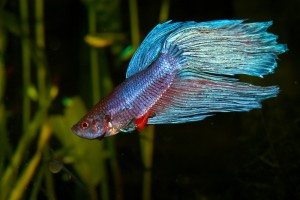Betta FAQ’s
- Also known as Siamese Fighting Fish
- Bettas don’t like water current.
- The average adult betta is about 2 ½ inches long, excluding the tail.
- They’ll quite often live up to about 3 years but they need the proper care in order to be healthy and survive.
- Their main food staple is insects.
The Don'ts
- Don’t be tempted to buy more male bettas than you can provide individual living environments for.
- Don’t get into the habit of aggravating your male betta just so you can see him flare his fins. This is only going to create stress for the fish and could threaten his health.
5 ways to keep the betta environment healthy
- Getting off to a good start with a healthy tank now means you have to keep it that way. Every day you should check the filter of the tank and change it if necessary.
- Monitor the temperature on a daily basis.
- If you’re housing your betta in a water container that holds less than 2 gallons of water, change the water every week.
- Larger sized aquariums will need anywhere from 10-25% of the water changed every 2 weeks on average. If the water quality is becoming poor then it will need to be changed more frequently.
- You need to make sure the water is safe for your fish when adding water or doing water change. It’s important to neutralize chlorine, chloramine and heavy metals and also reduce nitrate toxicity by adding the correct water conditioner to suit your betta. This will also protect scales and fins.
Where should I keep my betta?
- The smallest size aquarium you should use is a ¼+ gallon tank.
- You’ll need to keep the water temperature between 72-82 degrees.
- IMPORTANT – This type of fish doesn’t like a lot of water current, so make sure very little, if any, exists.
You should have a slightly different environment for male betta fish compared to the female.
![]() You must keep your males separated in individual tanks that contain no less than 1 litre of water. You can put your male bettas in with other types fish that are not known to be aggressive.
You must keep your males separated in individual tanks that contain no less than 1 litre of water. You can put your male bettas in with other types fish that are not known to be aggressive.
![]() Use caution when mixing your betta in with other fish. They can become aggressive with other fish like guppies for instance.
Use caution when mixing your betta in with other fish. They can become aggressive with other fish like guppies for instance.
Female bettas will live quite nicely together in 1 tank or along with other types of aquarium fish.
Note: The stability of the water is really important.
Betta Fish Tank Filter
A sponge filter is the safest filter for bettas because they produce very little current. We know bettas don’t like water current and sponge filters are gentle for delicate fish like bettas.
Note: A sponge filter will need to be frequent cleaned as it quickly clogs with excess waste.
How often and how much should I feed my fish?
Taking care of betta includes the proper diet for them.
- Watch your Betta closely to see how much your ‘fighting fish’ can consume in a 3 to 5 minute period of time.
- Feed this amount 3 times a week.
- If you’re buying frozen betta food make sure you thaw it first before feeding it to your fish.
Characteristics of betta
Knowing how your fish normally acts when happy and healthy helps you quickly recognize if the fish is getting sick.
- A healthy betta usually breathes from the surface of the water.
- If they are upset or feel threatened they’ll flare their fins.
- Male bettas are notorious for attacking other male bettas and they’ll even go after other aquarium fish that have flowing fins.
Signs your betta is sick
Your male betta should have vibrant colors. Either gender should appear active and alert and take their food readily.
You can prevent health problems for them by not overcrowding the tank which contains the females.
The sick betta will show some physical signs that something is wrong.
- Their color may fade
- You might see a fungus developing on the mouth or body
- Overall the fish may appear listless or show signs of labored breathing
Common ailments that can affect your betta are fin rot and ich.
The procedure for taking care of betta fish is really quite simple, but they do demand some commitment. Setting up a routine for the care of your fish will help prevent a lot of potential problems, cut down on the maintenance requirements and bring you a lot of enjoyment.
Find out more here about Nutrafin Betta Plus and how this water conditioner is designed to help protect Bettas.
You may also like
 What is the Best Water Conditioner for Betta Fish?
What is the Best Water Conditioner for Betta Fish? How To Select The Best Aquarium Filter
How To Select The Best Aquarium Filter How to Take Care of A Goldfish – A Beginner’s Guide
How to Take Care of A Goldfish – A Beginner’s Guide How to Care for Fancy Goldfish – The Perfect Environment
How to Care for Fancy Goldfish – The Perfect Environment A Simplified Approach To Keeping Your Goldfish Healthy
A Simplified Approach To Keeping Your Goldfish Healthy Goldfish Lays on Bottom of Tank – Causes and Treatment
Goldfish Lays on Bottom of Tank – Causes and Treatment


